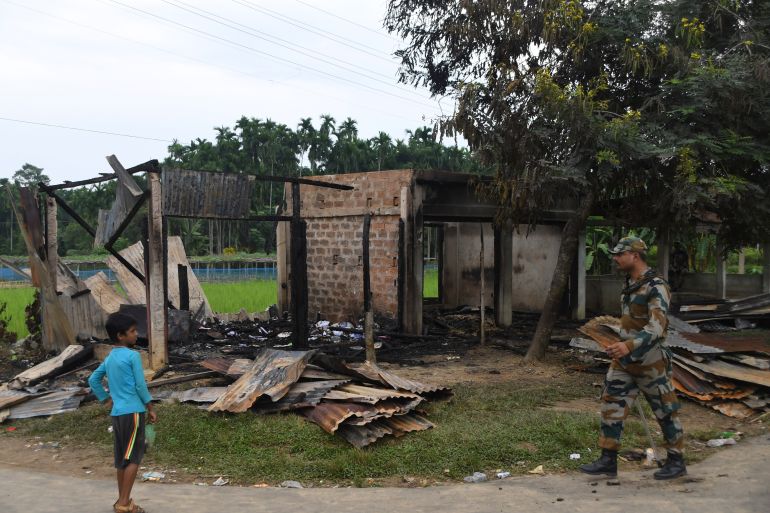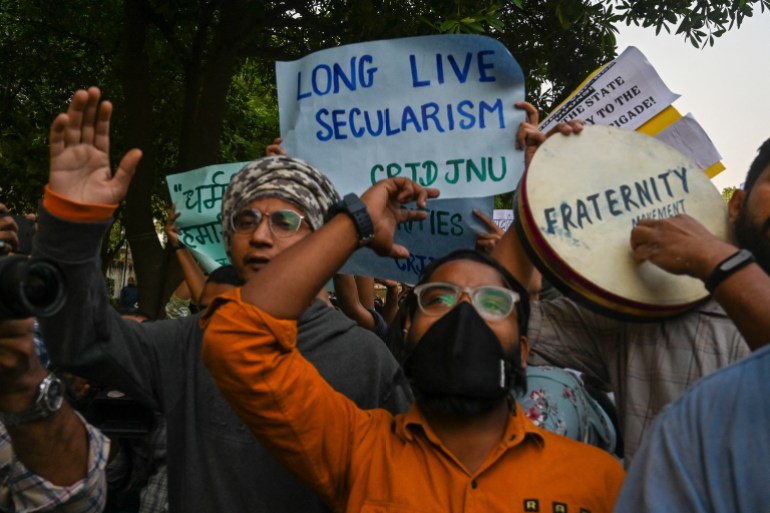India: Terror cases over social media posts on Tripura violence
Police charge more than 100 social media accounts under UAPA and other laws for posting on religious violence in the northeastern state.

New Delhi, India – For several times since Saturday, the dreadful thought of having to spend time in jail has crossed the mind of a 20-year-old Indian journalist working for a small and emerging news outlet.
The social media account of the journalist, who did not want to be named, is among 102 Twitter, Facebook and YouTube accounts being investigated by the police in the northeastern state of Tripura under the stringent Unlawful Activities (Prevention) Act or UAPA.
Keep reading
list of 4 itemsHate campaign in India against Urdu for being a ‘Muslim’ language
‘To dehumanise, terrorise us’: Muslims evicted in India’s Assam
‘Shown their place’: Muslim livelihoods under attack in India
The social media accounts are accused of sharing “fake news” following attacks on several mosques in Tripura last month by alleged members of Hindu right-wing groups.
The Editors Guild of India is deeply shocked by the Tripura Police’s action of booking 102 people, including journalists, under the coercive Unlawful Activities (Prevention) Act, for reporting and writing on the recent communal violence in the state. pic.twitter.com/bkDssiqOXK
— Editors Guild of India (@IndEditorsGuild) November 7, 2021
The rare incidents in the remote state bordering Bangladesh were an apparent retaliation to the religious violence in that country after a photo of the Quran placed on an idol of a Hindu deity during the Durga Puja festival triggered riots in which at least two Hindus were killed.
Days after the Bangladesh violence, members of the far-right Vishwa Hindu Parishad (World Hindu Council or VHP) and other Hindu groups took out protest rallies in Tripura and allegedly attacked Muslims and their religious places, including mosques.
The VHP is affiliated to the Rashtriya Swayamsevak Sangh (RSS), the ideological mentor of Prime Minister Narendra Modi’s Bharatiya Janata Party (BJP), which also runs the state government in Tripura.
‘I was just doing my job’
The violence and vandalism have left Tripura’s 350,000 Muslims scared as journalists, activists, lawyers and community leaders continue to demand action against the perpetrators.

The police claim misleading information and images were shared on social media to allegedly whip up further violence – an allegation denied by the accused.
“I was just doing my job of reporting an assault on a Muslim man [in Tripura]. I also mentioned how the police immediately came to his rescue,” the young journalist told Al Jazeera.
“Instead of arresting the rioters, police are going after journalists and activists.”
Another accused, a senior member of the Students Islamic Organisation of India, told Al Jazeera the cases against him and others are meant to “harass those who are raising their voice against injustice and divert attention from violence”.
He said his tweet was not fake and that he had all the evidence and testimonies to back up his claim.
If convicted under UAPA, the accused could be jailed for up to seven years.
Mr. Home Minister @AmitShah
“Tripura is Burning” #Tripura_Is_Burning pic.twitter.com/kSGgATiqec
— Shyam Meera Singh (@ShyamMeeraSingh) November 7, 2021
Last week, a team of Supreme Court lawyers visited Tripura’s restive regions and released a fact-finding report on the violence.
A day later, two members of the team – Ansar Indori and Mukesh Kumar – were accused of making statements “promoting enmity between religious groups as well as provoking the people of different religious communities to cause breach of peace” and charged under various laws, including UAPA.
Indori said he was “baffled” by the harsh charges and wondered why he was booked.
“We went there to serve democracy and protect the rights of citizens,” he said. “We did our work within the ambit of the law and engaged with the police and administration,” he told Al Jazeera.
By filing the cases, he said, the BJP government was giving a message that it cannot be held accountable for the violence and that there will be consequences for asking questions.
“Naturally, this will send fear among the civil society and every activist will think twice before uttering a word.”
Journalists and activists have also accused the Tripura police of underplaying and denying reports of attacks and burning of mosques, and claiming the situation was under control.
Rahul Gandhi, leader of India’s main opposition party, the Congress, said the cases against the journalists and activists was the BJP’s “cover-up tactic” by “shooting the messenger”.
“Truth can’t be silenced by UAPA,” Gandhi tweeted on Monday.
Pointing out that #Tripura_Is_Burning is a call for corrective action. But BJP’s favourite cover-up tactic is shooting the messenger.
Truth can’t be silenced by #UAPA.
— Rahul Gandhi (@RahulGandhi) November 8, 2021
But the police in Tripura claim they found “some known and unknown persons and organisations directly or indirectly abetting the offence – promoting hatred and enmity – through social media as a part of the conspiracy”.
Arindam Nath, inspector general of police in Tripura, defended the use of UAPA against the 102 accused.
“We used these laws because the volume of social media posts was enormous. We came across 150 posts, of which we shortlisted 102 accounts for sharing provocative material,” he told Al Jazeera over the telephone.
The cases over social media posts is the latest escalation in the government’s crackdown on online dissent in India.
In April, when the country was in the throes of a brutal second wave of the coronavirus pandemic, the government asked Twitter to block all content critical of its handling of the crisis.
Earlier this year, India also came up with new information technology laws to regulate social media and digital news. While the government has defended the moves citing national security, rights groups and experts have raised concerns about free speech.
According to Mishi Choudhary, a New York-based lawyer and activist, while the police can seek the help of social media companies for an investigation, it cannot ask for the blocking of a person’s account.
She told Al Jazeera that only the central government is authorised to make such requests under India’s laws and called the cases filed in Tripura an example of “overactive policing”.
“Also, the misuse of UAPA against individuals in cases that do not necessarily fall in the category of terrorism cases must stop.”